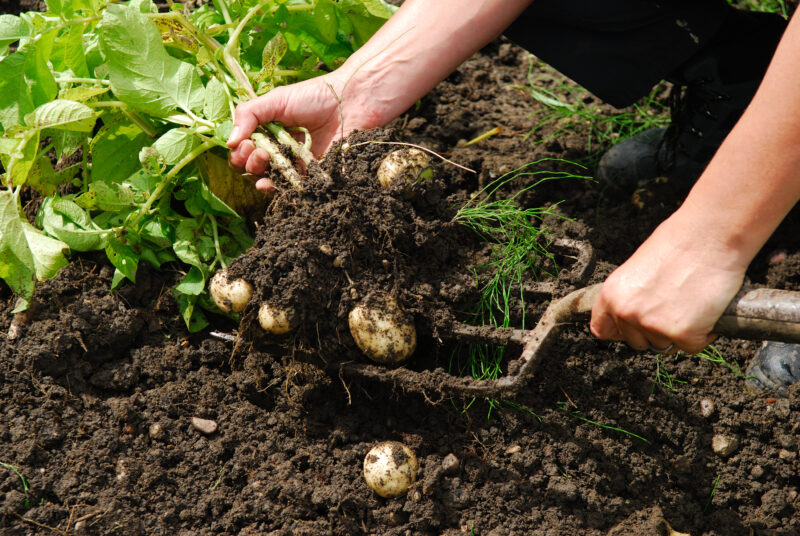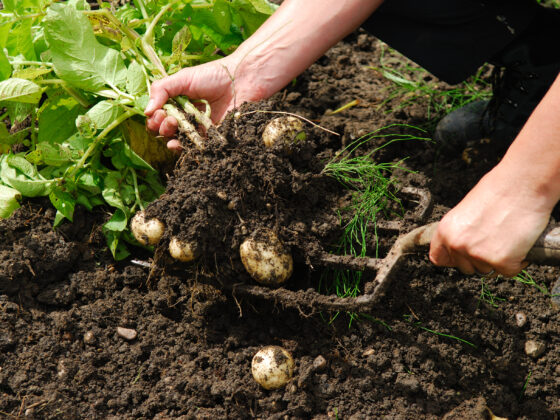Not everyone has land to grow food on and that’s OK, we can work around it with some creative thinking.
In the introductory guide, what is food self sufficiency? I discussed how self-sufficiency was not about growing as much food as you can on your own plot of land to become ‘self sufficient’; but rather, about reducing your dependence on the commercial system to enable you to rely on it less.
The potato, as humble as it may be, can go a long way towards helping you achieve this because potatoes can be stored for months after you buy them if kept in the right conditions.
Why Potatoes For Long Term Storage?
Potatoes have been a staple in the European diet since at least the early 1500s.
They are rich in calories, minerals, vitamins and protein and virtually free of fat.
They are easy to grow and plentiful to buy (currently) and can be prepared and cooked in a thousand different ways. Right now, in March 2022, you can buy a 2kg bag of potatoes from a supermarket for about £2.
A 2kg bag of potatoes will feed a family of 4 for 3 days in a tough spot. At the going rate then; you could buy enough potatoes to feed yourself for a week for £6 and have leftovers.
On top of all of that, potatoes can be stored for months if you do it right.
Before we get to that, we must first understand how large-scale agricultural warehouses do it and what happens to your potatoes during the journey to your cupboard.

How Do Agricultural Warehouses Store Potatoes So They Last For Months?
By the time you buy your potatoes from the supermarket, they will most likely have already been in storage for months.
The agricultural warehouse from which they come will also likely have hundreds of tonnes more potatoes sitting there ready to be shipped throughout the season.
These potatoes need to be kept in an ideal climate controlled environment designed specifically to make potatoes last for months. The process by which this is achieved is:
- Drying
- Cooling or heating
- Curing
- Storage proper
When potatoes fresh from the field enter the warehouse, they begin this 4-step process.
It is only at the point of exit from storage (en-route to your supermarket), that they are wiped clean and bagged up.
This is important to know in the context of storing potatoes you buy from the shop for months, because at the point of exiting the warehouse, the potatoes are already beginning to spoil.
The Ruthless Journey From Warehouse To Point of Sale
During their journey from the warehouse to your supermarket, the potatoes have been:
- Rinsed
- Wiped
- Bagged
- Transported
- Left on a shelf to warm up under LED lights
This process kickstarts the spoilage and encourages moisture to build up inside the plastic bag so that by the time you buy them, the potatoes are already on their way out.
Had they been left in the warehouse, it’s likely they would have been good for a few more months.
This is good info because if you know what causes potatoes to spoil, you can avoid it when you select which potatoes to buy and subsequently bring them home.
What Causes Potatoes To Spoil?
Potatoes spoil because they are kept in too hot or cold a temperature, are subject to too much moisture, have very little airflow around them and experience too much light.
The other thing as well that often goes unmentioned is onions & apples. Onions & apples give off Ethylene gas which increases the speed at which potatoes spoil. Don’t keep potatoes in the same drawer as onions or apples!
In the journey from being picked, rinsed and packed at the warehouse, the potatoes take on moisture. They also experience an increase in temperature and are then bagged up in plastic bags with limited airflow.
This environment encourages the growth of bacteria and potato respiration.
Respiration + increasing temperature encourage the growth of sprouts.
Sprouts begin the process of tuber weight loss and rot.
To fully understand how you can store potatoes for months after you buy them from the store, you have to appreciate the journey the poor tubers go through just to get to you.
Once you are aware of this, you can do all you can to stop the process of spoilage as soon as possible.

The Best Way To Store Potatoes For Months After You Buy Them
Now you know the chief architect in the spoilage of potatoes is the combination of heat, light and moisture, you need to fix that immediately.
I have two methods of storing potatoes you buy from the supermarket for the long term. The best method for you depends on the type of potatoes you buy.
The first method is applicable to potatoes you buy that have already been bagged in plastic bags and the second (my preferred option) applies to the big sacks of potatoes you can buy that still have all the dirt on them.
Method One: For Storing Pre-Washed Potatoes That Come In Plastic Bags
I’ll start with this one because it’s probably the most likely scenario for most people.
If you’re buying plastic bags of potatoes from the supermarket that have already been rinsed, washed and bagged then (as soon as you get home), you need to:
- Take all of the potatoes out of the plastic bag and inspect them for any bruising, cuts or sprouts. Potatoes with bruises, cuts & sprouts will spoil even in good conditions if they’ve come from a plastic potato bag at the supermarket. Separate these from the rest and make a plan to eat them first.
- Pat down the remaining potatoes with a kitchen towel to soak up any condensation or dampness that has built up in the journey. Take care not to wipe clean any dirt that may still be on them because this can help with the storage process.
- Put aside the potatoes you’re going to use within the next week.
- Place the remainder of the potatoes in a large hessian sack, taking care not to bump, bruise or scrape any as you fill up the bag. If you don’t have a hessian sack; a plastic, wooden or cardboard tray with ventilation holes in it will do as long as the room you’re going to store them in will be kept dark.
- Store the sack full of potatoes in a shed, garage or cellar that has good airflow and as close to a constant temperature of 7.5c as possible. I have another guide coming soon about how you can create a temperature controlled ‘cellar’ in a garage to achieve this.
Once properly stored in this way, your potatoes should last months. There is a chance with this method however that the spoilage process has already begun and will therefore not be as reliable as method two.
IMPORTANT NOTES:
There are a couple of very important habits to get into to make this process work every time.
- Get into a habit of knowing when your supermarket stocks up its potatoes
- Make sure to be there and buy them as fresh to the shelf as possible
- Don’t waste any time when you get home in unpacking and storing them

Method Two: For Storing Big Sacks of Potatoes That Still Have All The Dirt On Them
This is my preferred method for storing potatoes for months after you buy them because it is simply more reliable.
In most supermarkets, alongside the smaller plastic bags of potatoes, you will usually find some big 20kg sacks. These sacks are almost always made of thick brown paper and there will be no windows or vents on them.
Oftentimes, the potatoes will be described as ‘general purpose’ or ‘british grown’, or some other generic term as if making you think they are somehow less superior to their branded cousins.
These are the potatoes that will store the best.
Unlike the potatoes in the smaller plastic bags, these will not be washed and will still have all the dirt on them.
This means they haven’t been subject to rinsing, condensation or moisture like those in the plastic bags and, because they’re still covered in dirt and packed in a dark bag with no light, will have been more resistant to the journey to the supermarket.
To store these potatoes for months after you buy them:
- Take all of the potatoes out of the bag and inspect them for any bruising, cuts or sprouts. Potatoes with bruises, cuts & sprouts will spoil even in good conditions. Separate these from the rest and make a plan to eat them first.
- Put aside the potatoes you’re going to use within the next week.
- Place the remainder of the potatoes back into a large hessian sack, taking care not to bump, bruise or scrape any as you fill up the bag. If you don’t have a hessian sack; a plastic, wooden or cardboard tray with ventilation holes in it will do as long as the room you’re going to store them in will be kept dark.
- Store the sack full of potatoes in a shed, garage or cellar that has good airflow and as close to a constant temperature of 7.5c as possible. I have another guide coming soon about how you can create a temperature controlled ‘cellar’ in a garage to achieve this.
This really is the best way to store potatoes for months after you buy them and gives you a cost-effective way to become more self-sufficient that doesn’t require you to have much land or grow all of your own food.
If you do have some land (but not a lot) or you have a concrete yard or patio, you can still grow potatoes without a garden. It just requires a little bit of extra creativity – which I know you have in abundance.













